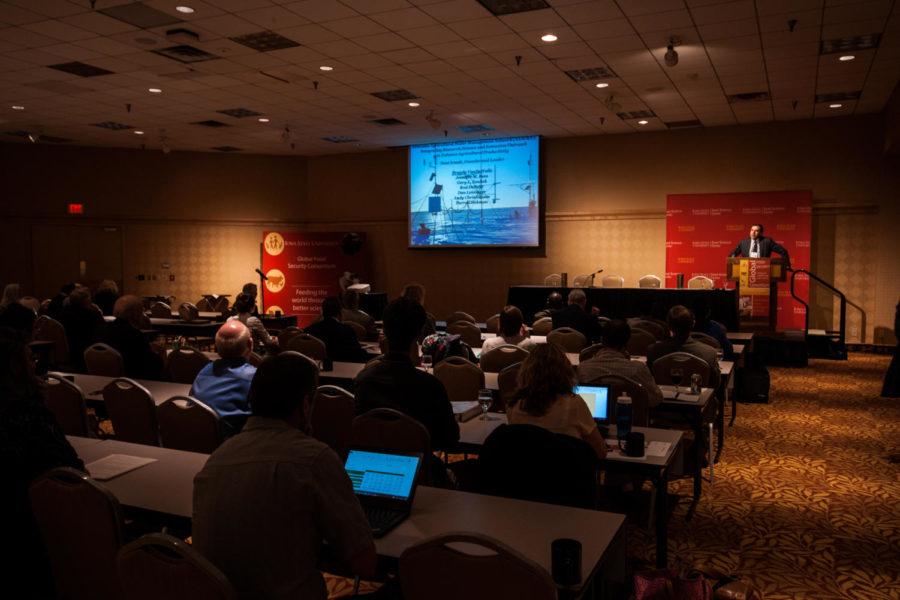Global Food Consortium returns to ISU
The Global Food Security conference took place at Gateway Hotel in Ames on April 14 and April 15.
April 15, 2015
One of every seven people in the world go to bed hungry and malnourished.
A worldwide initiative hosted at Iowa State addressed solutions to the international crises through global collaboration.
For the second year running, Iowa State’s Seed Science Center hosts the Global Food Security Consortium, a worldwide initiative that combines holistic, interdisciplinary and new methods to problems surrounding food safety.
“The Global Food Consortium believes that a child who does not eat or is malnourished, does not learn, does not laugh, cannot grow,” said Manjit Misra, director of ISU’s Seed Science Center and chair of the Global Food Security Consortium. “The consortium is dedicated to solving this grand challenge through partnerships.”
Speakers at this year’s event include Arlene Mitchell, executive director of the Global Child Nutrition Foundation, John Bowman, senior agricultural adviser with the United States Agency for International Development Bureau for Food Security and Sara Lilygren, executive vice president of corporate affairs for Tyson Foods, Inc.
Leaders in the agricultural industry flocked from across the world to attend the consortium, from Honduras to Washington, D.C.
“Our symposium will provide an important forum for some of the brightest and best to come together to collectively think outside the box,” said Max Rothschild, Charles F. Curtiss Distinguished Professor of Agriculture and Life Sciences and co-director of the consortium.
The consortium was kicked off by Mitchell, who spoke about the nutrition gap in children across the world. He said undernutrition affects 800 million in the world today, while over-nutrition affects more than 1.4 billion people.
Mitchell questioned if American agriculture was too narrowly focused on food and calories, yield and productivity, producing maize, wheat and rice.
“More than half of the worlds harvested agriculture areas are devoted to cereal crops, corn, wheat and maize primarily,” Mitchell said. “We search for a way to bring agriculture and nutrition together and we haven’t done a very good job of it.”
Anthony Hansen, senior in biology and animal science, attended the consortium for a class assignment, however was excited to hear speaker John Bowman.
“This is part of an assignment for animal science 441X. In that class, we talk about food security for developing countries,” Hansen said. “I’m most looking forward to John Bowman. He is very interactive with college students.”
After Bowman spoke, Hansen hoped to get a chance to talk to him about his experiences with food security overseas.
Bowman, who has 30 years of experience in horticulture, nutrition and agriculture research, has worked on projects in 40 countries. His talk focused on three international collaborations that incorporate horticulture to tackle nutrition.
“Farmers are facing drought, high temp and unpredictable weather. We have to give them better resilience,” Bowman said. “These challenges are all met very well by sustainable programs in horticulture. You get income generation, diversification of the staple crops, you can do intensive farming.”
Professionals from Heifer International, global companies and 50 professors at land grant universities are all involved in the Global Food Consortium. With hopes to collaborate with all reaches of agricultural professionals, the consortium continues to work toward diminishing hunger and malnutrition.
“In essence, we are the hunger fighters of the world,” Misra said.







